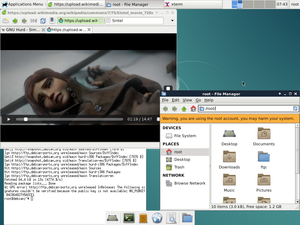
Back GNU AF جنو Arabic GNU AZ ГНУ Bulgarian গ্নু Bengali/Bangla GNU BS GNU Catalan گنوو CKB GNU Czech GNU Danish
 | |
 | |
| Developer | Community |
|---|---|
| Written in | Various languages (notably C and assembly language) |
| OS family | Unix-like |
| Working state | Current |
| Source model | Free software |
| Latest preview | 0.9 (18 December 2016) [±] |
| Marketing target | Personal computers, mobile devices, embedded devices, servers, mainframes, supercomputers |
| Platforms | IA-32 (with Hurd kernel only) and Alpha, ARC, ARM, AVR32, Blackfin, C6x, ETRAX CRIS, FR-V, H8/300, Hexagon, Itanium, M32R, m68k, META, MicroBlaze, MIPS, MN103, OpenRISC, PA-RISC, PowerPC, s390, S+core, SuperH, SPARC, TILE64, Unicore32, x86, Xtensa, RISC-V (with Linux-libre kernel only) |
| Kernel type | Microkernel (GNU Hurd) or Monolithic kernel (GNU Linux-libre, fork of Linux) |
| Userland | GNU |
| License | GNU GPL, GNU LGPL, GNU AGPL, GNU FDL, GNU FSDG[1][2] |
| Official website | gnu.org |
GNU (/ɡnuː/ ⓘ)[3][4] is an extensive collection of free software (394 packages as of June 2024[update]),[5] which can be used as an operating system or can be used in parts with other operating systems.[6][7][8] The use of the completed GNU tools led to the family of operating systems popularly known as Linux.[9] Most of GNU is licensed under the GNU Project's own General Public License (GPL).

GNU is also the project within which the free software concept originated. Richard Stallman, the founder of the project, views GNU as a "technical means to a social end".[10] Relatedly, Lawrence Lessig states in his introduction to the second edition of Stallman's book Free Software, Free Society that in it Stallman has written about "the social aspects of software and how Free Software can create community and social justice".[11]
- ^ "GNU Licenses".
- ^ "GNU FSDG".
- ^ "What is GNU?". The GNU Operating System. Free Software Foundation. September 4, 2009. Retrieved October 9, 2009.
The name 'GNU' is a recursive acronym for 'GNU's Not Unix'; it is pronounced g-noo, as one syllable with no vowel sound between the g and the n.
- ^ Cite error: The named reference
rms-zagreb-talkwas invoked but never defined (see the help page). - ^ Stallman, Richard. "Software – GNU Project". GNU Project. Free Software Foundation, Inc. Retrieved January 9, 2022.
- ^ Cite error: The named reference
handbookonopensourcewas invoked but never defined (see the help page). - ^ "GNU Manifesto". GNU project. FSF. Retrieved July 27, 2011.
- ^ Raymond, Eric (February 1, 2001). The Cathedral & the Bazaar: Musings on Linux and Open Source by an Accidental Revolutionary. "O'Reilly Media, Inc.". pp. 10–12. ISBN 978-0-59600108-7.
- ^ "1.2. What is GNU/Linux?". www.debian.org. Retrieved June 7, 2024.
- ^ Stallman, Richard (1986), "KTH", Philosophy (speech), GNU, Stockholm, Sweden: FSF.
- ^ Stallman, Richard M.; Gay, Joshua (December 2009). Free Software, Free Society: Selected Essays Of Richard M. Stallman. CreateSpace Independent Publishing Platform. ISBN 9781441436856. Retrieved March 24, 2016.